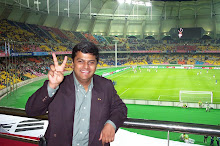‘As you like it' is the drama where Shakespeare’s Famous quote: “Life is a stage and we are all actors” features. Yes, I liked it: the entire process of Drama. I have a striking similarity with Delhi CM Arvind Kejriwal. I happened to be Governor of Hindi Technology Dramatic Society during my final year at IIT Kharagpur just like what he was in there. I think he has used his dramatic skills during his socio-political career as we have seen often. I am sure all of us have used drama skills at some point of life like him.
The entire process of drama is what the dramatists enjoy. Selection of Script, Casting, Reading of script, build the structure of the play using property, artwork, blending with music and lights, rehearsals, dress rehearsals, and finally the show. We, amateur dramatists, end the process there. Professionals have to deliver the show consistently. Some of us have written and built drama scripts for competitions. That again is an enriching experience. As we celebrate Ganesh Festival, many of us have started our theatrical journey performing drama during this festival in my part of the world. Ganesha is the lord of 64 arts including drama
Acting can help you portray your emotions in different ways, whether that be on stage or on camera, you leave your own mind and step into somebody else's! Drama is all about stepping out of your comfort zone, trying things you have never tried before, and playing someone completely opposite to who you usually are. It also helps one form a new group of friends who share the same hobbies and passion, it gives them focus and encouragement. The importance of drama and performing arts in education is significant. Whether children have the opportunity to perform in theatre productions or help out behind the scenes, studying Drama and Performing Arts not only engages with the creative side of the brain, it also provides an ideal balance in students’ patterns of study.
So many skills are learned in Drama: organizational skills, people skills, communication skills, motivation, commitment, independence, initiative, promptness, respect, acceptance, working under pressure, self-care, caring for others and working as a team. They develop tolerance and become more empathetic because of a role that requires an actor to inhabit it completely so they can perform on stage. An actor needs to have a better understanding of how the world works from the eyes of another person, which doesn't mean they necessarily have to agree with the character being portrayed. Drama is challenging because it requires a lot of imagination and thought from the actor so they can see the actions, they must also visualize the emotion, situation, surroundings, etc.
There is a fundamental theorem: Acting is all about reacting. It is about how you react to every situation. To be a good actor, you need to be extremely observant, too. Also As a director, you need to observe the minutest changes in the position of characters, stage properties, and dialogues. Drama teaches you communication skills which is an important pre-requisite for an entrepreneur. When many people are investing time, effort, and sometimes money: You need to be disciplined as nobody would compromise on any front. Respecting each other’s dedication requires you to reciprocate the same. You have to be on time, no matter what. You get more punctual. Drama teaches you how to be Patient. There are many personalities on stage some new to theatre, some extremely mature professional theatre artists, when the actor whose lines were before you forgets those and you lose the chance to say your longest and most favorite dialogue, you need patience!
You build advanced critical thinking and problem-solving skills in Drama. Taking a script and translating it into a finished product is a colossal exercise in critical thinking. You have to make tremendous inferences and intellectual leaps, and you have to have a keen eye for subtle clues. Another attribute you build is to be calm in a crisis. You’ve been on stage when somebody dropped a line and you had to improvise to keep the show moving with a smile on your face, in front of everyone. Your mic died in the middle of a big solo dialogue. You have to say it loud and you manage. You have an eye on audience perception: You know what will be liked by the audience and not. This is a very transferrable skill, and lots of people underestimate this. You have to sell and you adapt to what will sell. This quality is something that will go with you a long way. You become courageous: If you can say a long monologue in front of 1,000 people, you can do anything. You tend to become more resourceful: You’ve probably managed a big play in a small town like Kharagpur on a tight student Gymkhana budget. You know how to get a lot of value from minimal resources. You become a team player: You know that there are truly no small roles, only small actors. The show would fail without everyone giving their best, and even a brilliant performance by a star can be undermined by a poor supporting cast. We work together in theatre and (mostly) leave our egos at the stage door. We truly collaborate. You develop versatile skills: You can probably sing, act, and dance. But you can also run a sewing machine or a table saw. And you can rewire a lighting fixture or do a sound check or can use a paintbrush. In short, you know how to acquire new skills quickly. You become more flexible: You can work with some directors who inspired you. Others left you flat, but you did the work anyway. The same goes for your fellow actors, designers, and stagehands. Some were amazing and supportive; others were horrible and demoralizing to work with. You still manage to put up a show.
Life and Career is a high drama and drama experience equips you for that.


